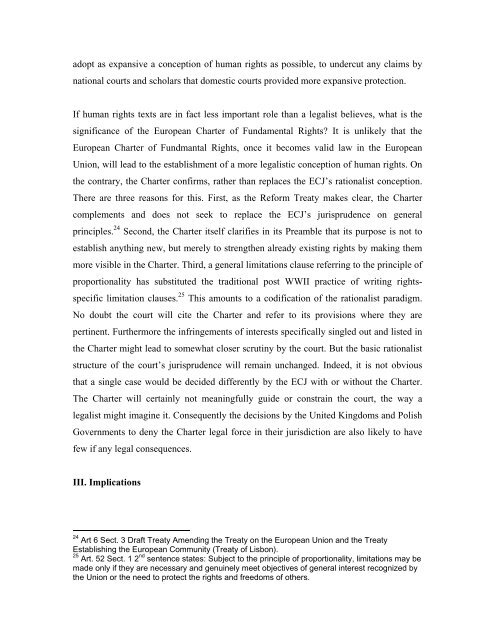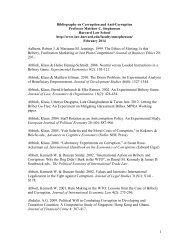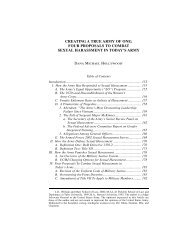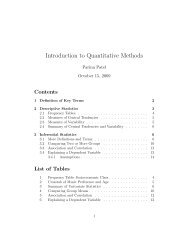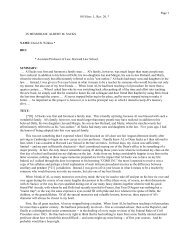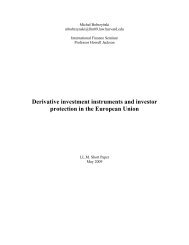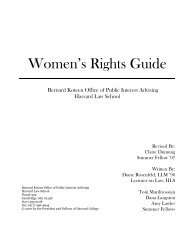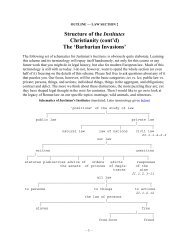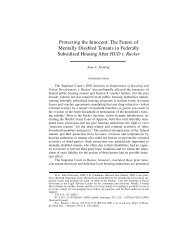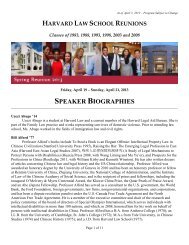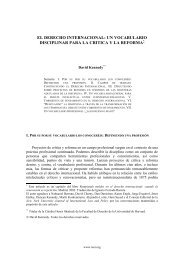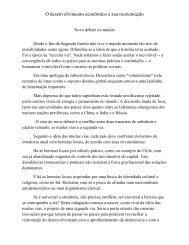Internationale Handelsgesellschaft, Nold and the New Human ...
Internationale Handelsgesellschaft, Nold and the New Human ...
Internationale Handelsgesellschaft, Nold and the New Human ...
Create successful ePaper yourself
Turn your PDF publications into a flip-book with our unique Google optimized e-Paper software.
adopt as expansive a conception of human rights as possible, to undercut any claims by<br />
national courts <strong>and</strong> scholars that domestic courts provided more expansive protection.<br />
If human rights texts are in fact less important role than a legalist believes, what is <strong>the</strong><br />
significance of <strong>the</strong> European Charter of Fundamental Rights? It is unlikely that <strong>the</strong><br />
European Charter of Fundmantal Rights, once it becomes valid law in <strong>the</strong> European<br />
Union, will lead to <strong>the</strong> establishment of a more legalistic conception of human rights. On<br />
<strong>the</strong> contrary, <strong>the</strong> Charter confirms, ra<strong>the</strong>r than replaces <strong>the</strong> ECJ’s rationalist conception.<br />
There are three reasons for this. First, as <strong>the</strong> Reform Treaty makes clear, <strong>the</strong> Charter<br />
complements <strong>and</strong> does not seek to replace <strong>the</strong> ECJ’s jurisprudence on general<br />
principles. 24 Second, <strong>the</strong> Charter itself clarifies in its Preamble that its purpose is not to<br />
establish anything new, but merely to streng<strong>the</strong>n already existing rights by making <strong>the</strong>m<br />
more visible in <strong>the</strong> Charter. Third, a general limitations clause referring to <strong>the</strong> principle of<br />
proportionality has substituted <strong>the</strong> traditional post WWII practice of writing rightsspecific<br />
limitation clauses. 25 This amounts to a codification of <strong>the</strong> rationalist paradigm.<br />
No doubt <strong>the</strong> court will cite <strong>the</strong> Charter <strong>and</strong> refer to its provisions where <strong>the</strong>y are<br />
pertinent. Fur<strong>the</strong>rmore <strong>the</strong> infringements of interests specifically singled out <strong>and</strong> listed in<br />
<strong>the</strong> Charter might lead to somewhat closer scrutiny by <strong>the</strong> court. But <strong>the</strong> basic rationalist<br />
structure of <strong>the</strong> court’s jurisprudence will remain unchanged. Indeed, it is not obvious<br />
that a single case would be decided differently by <strong>the</strong> ECJ with or without <strong>the</strong> Charter.<br />
The Charter will certainly not meaningfully guide or constrain <strong>the</strong> court, <strong>the</strong> way a<br />
legalist might imagine it. Consequently <strong>the</strong> decisions by <strong>the</strong> United Kingdoms <strong>and</strong> Polish<br />
Governments to deny <strong>the</strong> Charter legal force in <strong>the</strong>ir jurisdiction are also likely to have<br />
few if any legal consequences.<br />
III. Implications<br />
24 Art 6 Sect. 3 Draft Treaty Amending <strong>the</strong> Treaty on <strong>the</strong> European Union <strong>and</strong> <strong>the</strong> Treaty<br />
Establishing <strong>the</strong> European Community (Treaty of Lisbon).<br />
25 Art. 52 Sect. 1 2 nd sentence states: Subject to <strong>the</strong> principle of proportionality, limitations may be<br />
made only if <strong>the</strong>y are necessary <strong>and</strong> genuinely meet objectives of general interest recognized by<br />
<strong>the</strong> Union or <strong>the</strong> need to protect <strong>the</strong> rights <strong>and</strong> freedoms of o<strong>the</strong>rs.


